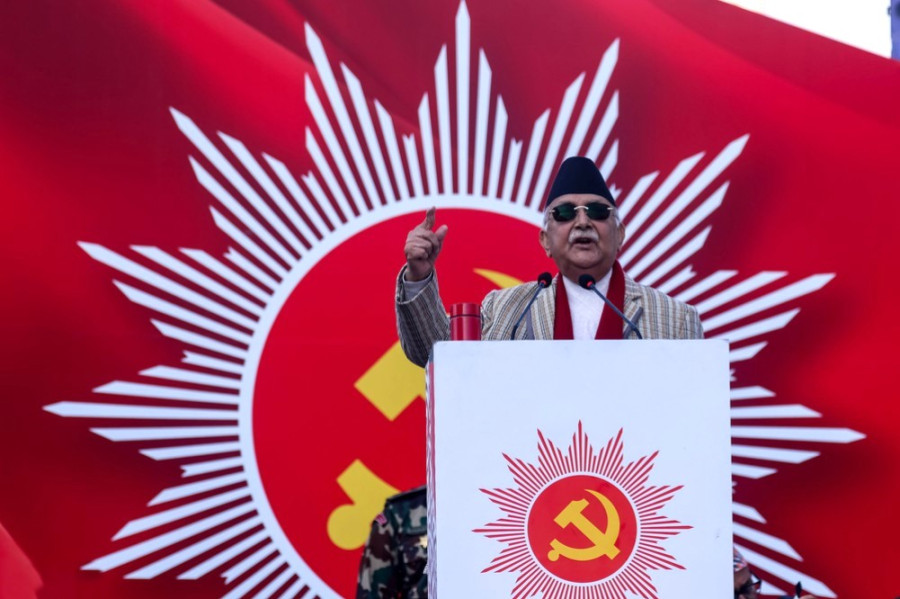Columns
Of rallies and realities
Without delivery, platforms like the ‘jagaran’ rally will only let the people down.
Mohan Guragain
In politics, timing carries a big message.
Prime Minister KP Sharma Oli’s CPN-UML staged a road show on Durbarmarg in front of the now-museum royal palace on November 22. Dubbed Jagaran Sabha, the ruling party’s unusual political rally followed the arrest of Durga Prasai, a former nominated central committee member of the UML, on the charge of making ‘baseless’ allegations against Oli that the sitting premier had huge investments in a Cambodian telecom company. Prasai, who is being investigated for cybercrime of circulating doctored documents online, once had unhindered access to the residences of Oli and his former comrade, the ex-PM Pushpa Kamal Dahal. It did not take Prasai long to harbour enmity against the two former insurgents.
Prasai’s allegations do not seem to hold much water, but there are calls in the political circles already to investigate if Oli, like many top Nepali leaders fairly or unfairly facing the charges of hiding their kickbacks abroad, has wealth stashed in a safe haven.
Oli’s feeble show of mass—against domestic rivals, conspirators and foreign foes alike—might be interpreted as the public no longer having an interest in chest-thumping politicians: All that matters is how much they can deliver in real terms. It was visible in the pictures that the UML workers and supporters who marched up to the rally had enormous space left to fill on the former King’s Way.
Many view Rabi Lamichhane’s earlier arrest and ongoing investigation in detention for over a month now, in a case of cooperatives savings embezzlement, as a fight between old forces and his newly formed outfit that once held the potential to corner traditional parties in the next round of elections. Doing his bit to unsettle the old guard is the independent Kathmandu mayor, Balen Shah, who one day threatens to burn down Singha Durbar and, on another, slaps a hefty fine on the prime minister’s party for failing to clean up after the rally before the day is barely over.
However, one thing has become amply clear: Old tricks have ceased to amuse Nepalis. They have bigger problems to tackle: Lack of jobs, ineffective healthcare, unproductive education and national humiliation caused by centuries of underdevelopment and their leaders’ shameless pomp.
Nepal’s global stature appears to be diminishing despite the country’s geostrategic location. Nepali passport bearers face harassment around the world in various ways. Even in the neighbourhood, the importance accorded to the Nepali government heads is shaky. Possibly due to New Delhi’s apparent refusal to receive the new Nepal prime minister even after a top New York meeting, Oli is bound for Beijing on Monday. This, by no means, should be a China card he’s playing, as Dahal alleged recently.
Nepal has its own interests to pursue, especially in the periphery. The country with a huge potential in hydropower wouldn’t have been able to sell clean energy to Bangladesh without India providing the transmission line. In the same vein, Kathmandu and Beijing have signed a mega connectivity framework to extend road, rail and communication networks. Oli’s China visit, in a break from the oft-followed tradition of Nepali prime ministers going to India first, has the signing of an agreement on President Xi Jinping’s flagship Belt and Road Initiative (BRI) high on the agenda.
The matter of concern for Nepalis is not where our prime minister goes first but what achievement we’ll have from our government’s engagements with our neighbours. And our neighbours should only be concerned if Kathmandu’s relations with any foreign capital harm their own national interests. Locked between two Asian giants, Nepal has no history of harming its neighbours’ broad interests, while it may have suffered immensely from their unilateral policies.
Both China and India are undeniable global powers, their economic and military might forever rising. While a smaller Nepal cannot afford to antagonise one of them, it reserves all the right to grow peacefully. Nepal can partner with its neighbours only in ventures it can afford and sustain. Even if our leaders, including Oli, tried to sway Nepalis with their balloony dreams in the past, the people living without ample means have come to grips with their bitter realities.
Yes, Nepalis today are deserting their country, but the vast majority of them want to build their lives and careers here in their own towns and villages. Whether more Nepalis will be frustrated to live in their country will depend on how effectively our political leadership works for the national good.
Since 2015, three old politicians have been playing the musical chair of power. Once on the hot seat, they are largely consumed by their urge to defeat opponents and thus have little appetite to serve the public or national interests. They’ve primarily relied on empty rhetoric to pacify a disenchanted public, but the old tool has lost its edge.
Oli’s Durbarmarg speech might have been intended to browbeat accusers and opponents and calm the segment of society getting tired of delayed delivery, but it utterly failed in its purpose. The same will be the fate of political workers who make promises but fail to keep them. On the demo day, Oli said there was no rule on which country a Nepali prime minister should visit first and that he was going to China not for a pleasure trip.
A country's foreign policy is often shaped by national politics. Sometimes, outreaches are made to assure the domestic public; sometimes, the signalling goes beyond. However, a botched foreign venture not only diverts domestic attention but can also create trouble.
People here will be watching what deal Oli cuts in Beijing or what concessions he’ll make to the Chinese president’s global connectivity project. The ruling Congress-UML coalition is split over how BRI projects should be funded. The official position of the Congress party is that Nepal should only accept grants to undertake such projects. Differences between Nepal and China have delayed BRI implementation even as Kathmandu signed it up in 2017. Postures from both sides will have much bearing on the Nepali sentiment that prosperity will trickle into the country from the north in case it takes a while to navigate the Ganga upstream.
Not least for his light demeanour, Oli is taken seriously only for his stance in the face of India’s blockade in 2015 and his opening up avenues across the Himalaya. His visit to the north this time draws a tangent to the south. BRI or no BRI, Nepali politicians must be able to reassure the domestic population that their aspirations will be fulfilled more by internal effort than through external dealings.
Without delivery, platforms like the jagaran (awakening) rally will only let the people down.




 11.12°C Kathmandu
11.12°C Kathmandu















